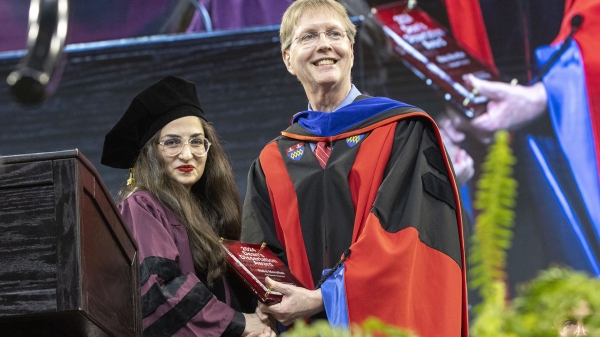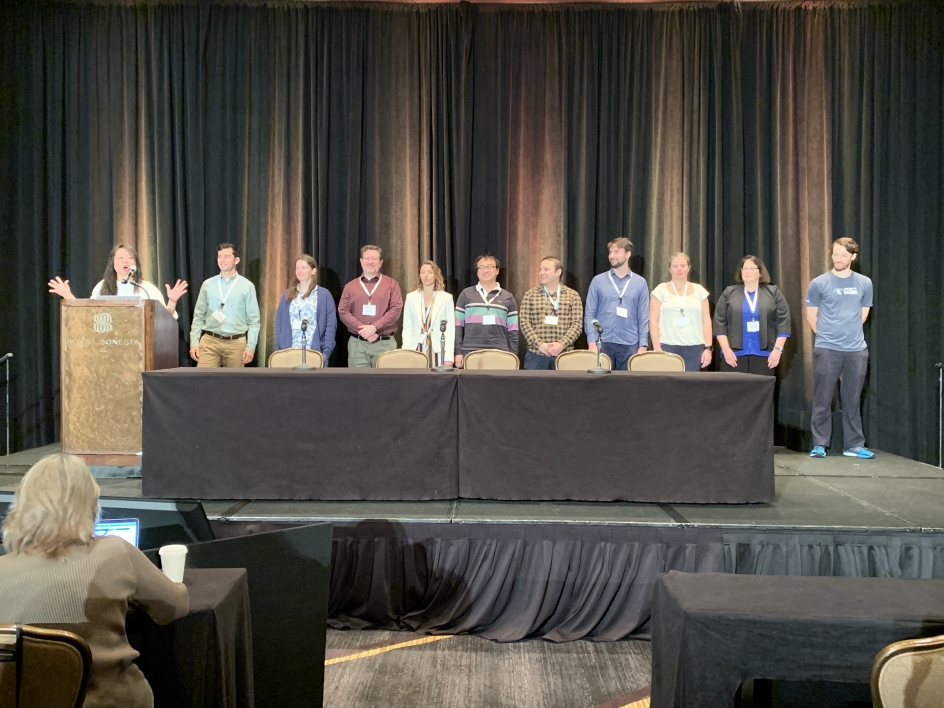ASU graduate student awarded fellowship to improve scientific web applications

Nicole Brewer is a PhD candidate for the history and philosophy of science program in the School of Life Sciences at ASU. She is working to make scientific software accessible and reproducible with scientific web applications. Photo courtesy Nicole Brewer
Arizona State University graduate research assistant and PhD candidate Nicole Brewer knows the importance of consistency and standardization across web applications and networks to ensure quality and accessibility of information. Now, she will be able to expand on the work she is doing in that space after having been named as one of the 2023 Better Scientific Software Fellows.
The BSSw Fellowship Program gives recognition and funding to leaders and advocates of high-quality scientific software. Each 2023 fellow will receive up to $25,000 for an activity that promotes better scientific software, such as organizing a workshop, preparing a tutorial or creating content to engage the scientific software community.
“It’s an exciting and unique award where she will be focusing on improving accessibility of research data and software with scientific web applications,” said Jessica Ranney, assistant director of the Center for Biology and Society.
Brewer is a PhD candidate for the history and philosophy of science program in the School of Life Sciences studying the science of science from the perspective of complex systems. Her research focuses on network analysis of scientific publications. She is working to make scientific software accessible and reproducible with scientific web applications.
Web applications provide accessible ways to disseminate research, teach, engage stakeholders and even update policymakers.
“I'm excited for this particular work, because I feel like I get to continue to promote better software practices in the context of my current research,” Brewer said.
Brewer’s background is in software engineering and mathematics. She currently serves on the steering committee for the United States Research Software Engineer Association and she holds a Bachelor of Science in mathematics with computer ccience from Purdue University.
Previously, she was a research software engineer at Purdue, where she developed web applications for domain scientists who were interested in making their work accessible and reproducible.
“I was wrapping researcher code in these web interfaces where users can point and click and select data and transform data, or run some sort of computation. And so we did that a number of times and finally turned it into a template, because we didn’t want to repeat ourselves too much,” Brewer said.
“So the work for this fellowship is to turn that template into a tutorial so that other people can do what we are doing,” she said.
This fellowship will allow her to demonstrate how Jupyter Notebooks can be used to easily adapt existing researcher code into web interfaces that hide underlying code from users. Brewer will develop tutorials for developing web applications in Jupyter Notebooks and compile various example applications into a “cookbook” that will provide a reader with recipes for various Jupyter-based web application capabilities.
“It’s a really nice fellowship, and she’s the only grad student to receive this — which is a high honor,” said Jane Maienschein, University Professor of History of Science; Regents, President's and Parents Association Professor; and director of the Center for Biology and Society.
Better Scientific Software is a central hub for sharing information on practices, techniques, experiences and tools to improve CSE software productivity quality and sustainability. It also focus on raising awareness of the importance of good software practices for scientific productivity and the increasing challenges facing CSE software developers as high-end computing heads to extreme scales.
Brewer and the other fellows were recognized at the Exascale Computing Project Annual Meeting in Houston earlier this year. Photo courtesy Lisa Ferichs
The main goal of the BSSw Fellowship program is to foster and promote practices, processes and tools to improve developer productivity and software sustainability of scientific codes. It gives recognition and funding to leaders and advocates of high-quality scientific software.
Brewer and the other fellows were recognized at the Exascale Computing Project Annual Meeting in Houston earlier this year.
“I’m honored and thrilled to get this award because I think that the way that we share our software and our data is so important to improving accessibility, especially among researchers,” Brewer said.
“And now I will be in a position to enable researchers to share their research in new ways, including nontraditional ways that are maybe sort of undervalued now and not very well developed. I get to be a part of promoting new formats and getting credit for them,” she said.
More Science and technology
Extreme HGTV: Students to learn how to design habitats for living, working in space
Architecture students at Arizona State University already learn how to design spaces for many kinds of environments, and now they…

Human brains teach AI new skills
Artificial intelligence, or AI, is rapidly advancing, but it hasn’t yet outpaced human intelligence. Our brains’ capacity for…

Doctoral students cruise into roles as computer engineering innovators
Raha Moraffah is grateful for her experiences as a doctoral student in the School of Computing and Augmented Intelligence, part…
